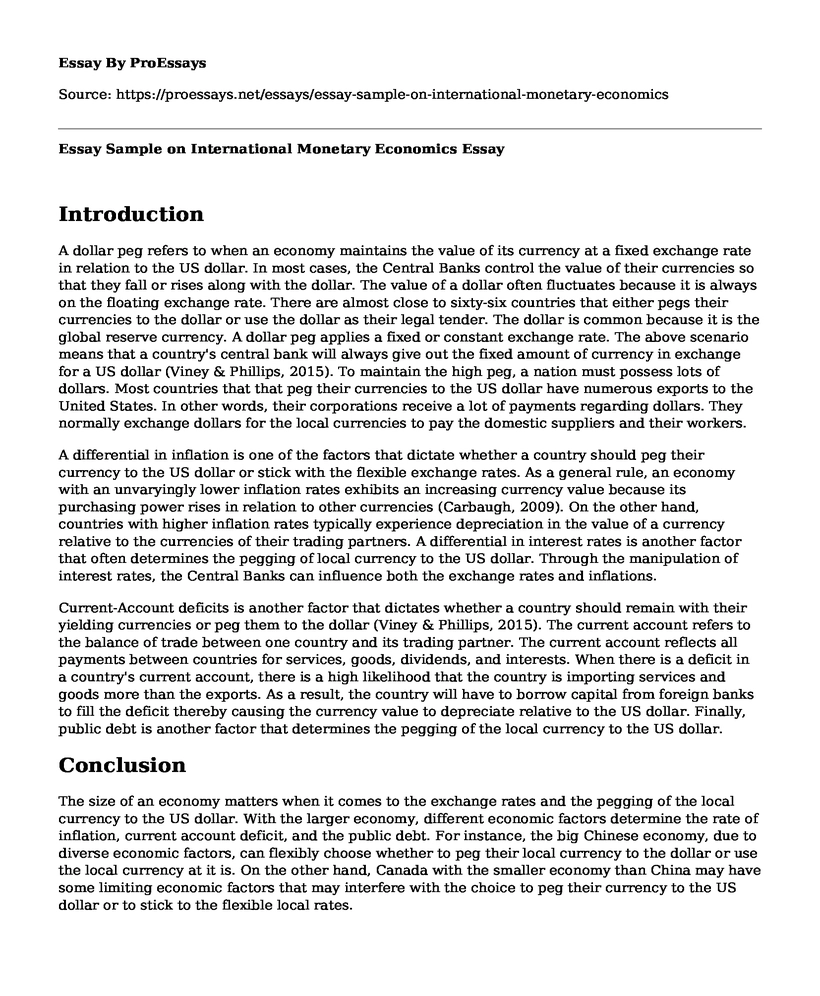Introduction
A dollar peg refers to when an economy maintains the value of its currency at a fixed exchange rate in relation to the US dollar. In most cases, the Central Banks control the value of their currencies so that they fall or rises along with the dollar. The value of a dollar often fluctuates because it is always on the floating exchange rate. There are almost close to sixty-six countries that either pegs their currencies to the dollar or use the dollar as their legal tender. The dollar is common because it is the global reserve currency. A dollar peg applies a fixed or constant exchange rate. The above scenario means that a country's central bank will always give out the fixed amount of currency in exchange for a US dollar (Viney & Phillips, 2015). To maintain the high peg, a nation must possess lots of dollars. Most countries that that peg their currencies to the US dollar have numerous exports to the United States. In other words, their corporations receive a lot of payments regarding dollars. They normally exchange dollars for the local currencies to pay the domestic suppliers and their workers.
A differential in inflation is one of the factors that dictate whether a country should peg their currency to the US dollar or stick with the flexible exchange rates. As a general rule, an economy with an unvaryingly lower inflation rates exhibits an increasing currency value because its purchasing power rises in relation to other currencies (Carbaugh, 2009). On the other hand, countries with higher inflation rates typically experience depreciation in the value of a currency relative to the currencies of their trading partners. A differential in interest rates is another factor that often determines the pegging of local currency to the US dollar. Through the manipulation of interest rates, the Central Banks can influence both the exchange rates and inflations.
Current-Account deficits is another factor that dictates whether a country should remain with their yielding currencies or peg them to the dollar (Viney & Phillips, 2015). The current account refers to the balance of trade between one country and its trading partner. The current account reflects all payments between countries for services, goods, dividends, and interests. When there is a deficit in a country's current account, there is a high likelihood that the country is importing services and goods more than the exports. As a result, the country will have to borrow capital from foreign banks to fill the deficit thereby causing the currency value to depreciate relative to the US dollar. Finally, public debt is another factor that determines the pegging of the local currency to the US dollar.
Conclusion
The size of an economy matters when it comes to the exchange rates and the pegging of the local currency to the US dollar. With the larger economy, different economic factors determine the rate of inflation, current account deficit, and the public debt. For instance, the big Chinese economy, due to diverse economic factors, can flexibly choose whether to peg their local currency to the dollar or use the local currency at it is. On the other hand, Canada with the smaller economy than China may have some limiting economic factors that may interfere with the choice to peg their currency to the US dollar or to stick to the flexible local rates.
References
Carbaugh, R. J. (2009). International economics. Mason, Ohio: South-Western Cengage Learning.
Viney, C., & Phillips, P. (2015). Financial Institutions, Instruments, and Markets. North Ryde: McGraw-Hill Australia.
Cite this page
Essay Sample on International Monetary Economics. (2022, Nov 05). Retrieved from https://proessays.net/essays/essay-sample-on-international-monetary-economics
If you are the original author of this essay and no longer wish to have it published on the ProEssays website, please click below to request its removal:
- Indian Rupee Essay
- Global Cities and Governance Essay Example
- Kirchnerism Government vs. Macri Government Essay
- Essay Sample on Depression, Panic and Job Loss: Sources of Struggles Beyond Boundary Problems
- Essay Example on Sacrifice Zones: Exploitation of People in West Virginia and Beyond
- Oman: International HRM for the 21st Century - Essay Sample
- Essay Example on US-China Trade War: Tariffs Mount, Global Influence at Stake







